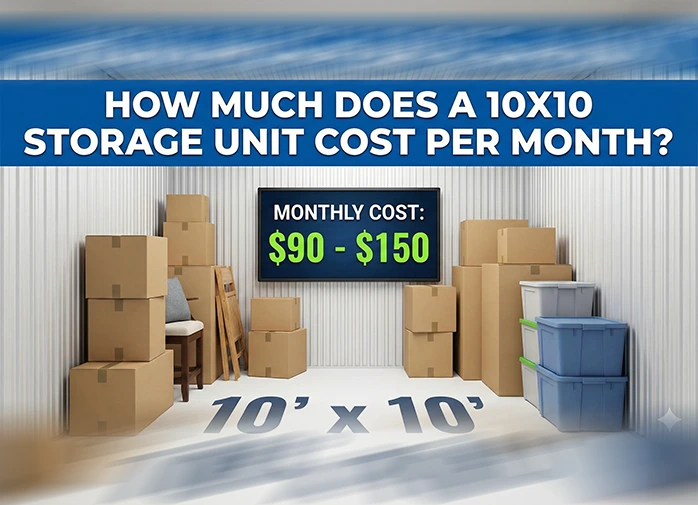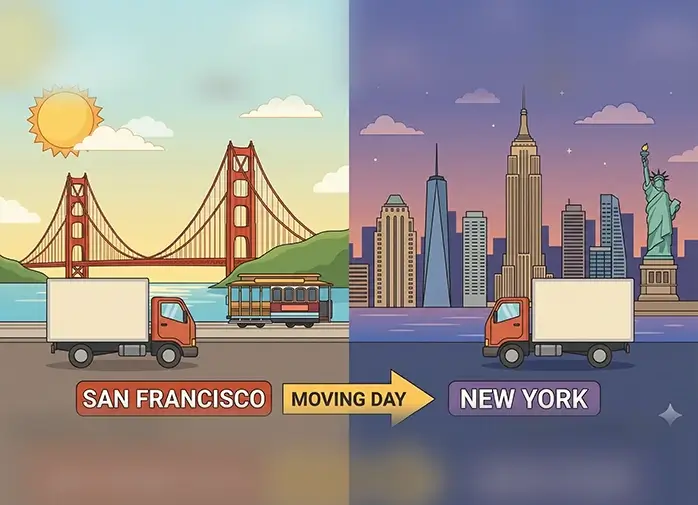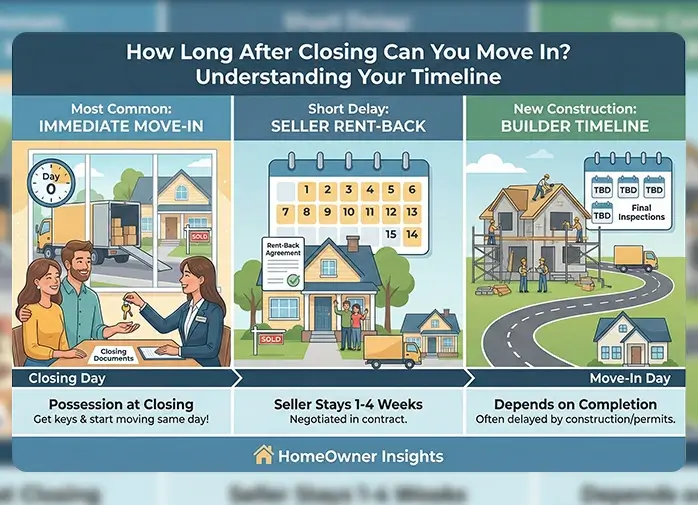To help maintain VanlinesMove.com and keep our resources free for users, we receive compensation from service providers featured on our site. This compensation comes from two primary sources: paid placements, which affect the order and visibility of providers’ offers, and affiliate links that may generate commissions when clicked. Not all providers in the market are included.
While this compensation influences placement, it does not impact our editorial content or recommendations. The information provided is for general informational purposes only and should not be taken as legal, financial, or professional advice. We recommend conducting thorough research and consulting experts before making any relocation decisions. For more details, please refer to our Terms of Use and Privacy Policy.

Moving to Washington D.C in 2025?
Complete Moving Guide
This is a complete guide for Moving to Washington D.C.
Get all the information you need to know about moving to Washington D.C.

Planning to move to Washington D.C?
Washington D.C. is a city with unique characteristics, and there are several factors to be considered before moving there. The city is known for its high cost of living, high rent, and expensive amenities. There are diverse neighborhoods with unique character. The primary mode of transportation is the D.C. Metro system, as driving and parking a car can be challenging. The job market in Washington D.C is strong, with numerous opportunities in sectors like government. The city has a rich culture and history with several museums and landmarks. The city enjoys all four seasons, with hot, humid summers and cold winters. Before you start planning your move to Washington D.C., explore it through our moving guide-
 Quick Facts About Washington D.C
Quick Facts About Washington D.C  Top Reasons To Move To Washington D.C
Top Reasons To Move To Washington D.C  Pros And Cons Of Living In Washington D.C
Pros And Cons Of Living In Washington D.C  Best Neighborhoods In Washington D.C
Best Neighborhoods In Washington D.C  Cost Of Living In Washington D.C
Cost Of Living In Washington D.C  Job Market In Washington D.C
Job Market In Washington D.C  Major industries in Washington D.C
Major industries in Washington D.C  Education System in Washington D.C
Education System in Washington D.C  Transportation And Navigation In Washington D.C
Transportation And Navigation In Washington D.C  Things To Do In Washington D.C
Things To Do In Washington D.C  Taxes In Washington D.C
Taxes In Washington D.C  Insurance Required In Washington D.C
Insurance Required In Washington D.C
Quick Facts of Washington D.C
Unique features and facts about Washington D.C.-
- The city was designed by Pierre Charles L’Enfant.
- The city is famous for its annual Cherry Blossom Festival.
- Washington D.C. is known as a City of Museums as it has many Smithsonian museums.
- The city is home to many embassies and international organizations.
- Go-go music is a unique music genre that originated in D.C.
Top reasons to move to Washington D.C
Moving to a new city is now become a tradition. Most people relocate to some new place to find something better in their life. Several reasons encourage a person to move to a new city. Here are the reasons that motivate you to move to Washington D.C.-

- Job Market- Washington D.C. is home to a vast range of federal government jobs in different sectors. Some of the thriving sectors in the city include healthcare, law, finance, technology, and more. The city is home to around 117 embassies, which makes the job market more diverse.
- Education- Washington D.C. has well-regarded public and private schools offering high-quality education. It is home to prestigious universities, such as Georgetown University, Howard University, and George Washington University.
- History and Culture- There are numerous iconic landmarks, museums, and monuments that reflect the association of the city in American history. The city is a melting pot of culture, which makes it more diverse.
- Transportation- Washington D.C.’s Metrorail system is highly efficient and extensive and makes commuting more convenient. It has designated bike lanes that make it more bike-friendly.
Pros & Cons of Living in Washington D.C
Moving to Washington D.C. will bring so many changes in your life. To easily adapt to those changes, it is better to learn about the pros and cons of living in the city-

| Pros of Living in Washington D.C | Cons of Living in Washington D.C |
|---|---|
| Job market is robust and it is home to several federal agencies and NGOs | It is known for its high cost of living, especially in terms of expensive housing |
| Public transportation system in the city is efficient and extensive | The city experiences hot, humid summers and cold snowy winters |
| The city is fully-equipped with parks and green spaces | Traffic can be an issue especially during the rush hours |
| It is home to several iconic landmarks, historical sites and more | Being the nation’s capital, the city is immersed in politics that can be stimulating |
| There are many top-notch educational institutions in the city | Finding a good work life balance is difficult in the city |
Best Neighborhoods in the Washington D.C
Moving to a new city can be emotionally and financially challenging. But if you explore the neighborhoods in your destination city, you will find a safe, friendly, and affordable neighborhood. For your convenience, we have listed some top neighborhoods in Washington D.C-

- Waikiki- This is an iconic and tourist-centric neighborhood. If you love beaches and nightlife, then this is your location. But, don’t forget the housing is expensive in this area.
- Kaimuki- This is a trendy and charming neighborhood with a mix of local shops, restaurants, and cafes.
- Hawaii Kai- This is a master-planned community with a mix of housing options. It is a family-friendly neighborhood but can be pricey. This location has shopping centers and marinas.
- Kahala- This is an exclusive and affluent residential area with large homes, a quite atmosphere, and excellent schools.
- Aina Haina- A family-friendly residential neighborhood with a mix of single-family homes and condos. There are good schools and a healthy atmosphere.
- Downtown Washington D.C- This is the business and financial center of Washington D.C with a mix of high-rise condos and offices. This location can be noisy.
- Palolo- This is a residential area with affordable housing options.
Cost of living in Washington D.C
While planning a move, it is crucial to learn about the cost of living in a new city. This will help you calculate the expenses and create a moving budget. The cost of living in Washington D.C is generally considered to be quite high. The cost of housing is the most significant expense. All other essential expenses like groceries, utilities, healthcare, and transportation are generally higher than the national average. Here, we have provided the breakdown of the cost of living in Washington D.C-

| Category | Washington D.C (in USD) |
|---|---|
| Housing (Rent/Mortgage) | $2,000 - $3,500+ |
| Utilities | $100 - $400+ |
| Groceries | $400 - $800+ |
| Food | $300 - $700+ |
| Transportation | $100 - $200 |
| Entertainment | $200 - $500+ |
Housing Market in Washington D.C
The housing market of Washington D.C. is complex and influenced by a number of factors such as location, political landscape, and more. The reason for an expensive housing market is the limited inventory. The housing market in the city experiences fluctuations depending on the neighborhood and type of property. The median sale price for a house in Washington D.C. is around $600,000.
Average rental cost in Washington D.C
The average rental cost for a house in Washington D.C. ranges between $1,800- $3,900 depending on the size of the property and its location in the city.
Washington D.C job market
The economy of Washington D.C is diverse and the job market of the city is majorly driven by the tourism industry. However, several sectors are contributing to the economic growth. The unemployment rate in the city is lower than the national average.
Top Career Options in Washington D.C
Here are statistics of the job market in Washington D.C., which includes average salary and entry-level salary.
| Job Title | Average Salary | Entry-Level Salary |
|---|---|---|
| Software Engineer | $135,000 - $195,000 | $70,000 - $90,000 |
| In-House Counsel | $134,000 - $195,000 | $80,000 - $110,000 |
| Federal Contractor | $66,000 - $140,000 | $45,000 - $65,000 |
| Program Manager | $100,000 - $120,000 | $60,000 - $80,000 |
| Data Scientist | $142,000 | $80,000 - $100,000 |
| Cyber Security Analyst | $110,000 - $130,000 | $70,000 - $90,000 |
Median Salary in Washington D.C
The median salary in Washington D.C is around $104,000 per year.
Transportation And Navigation In Washington D.C
The city offers a robust transportation system that makes commuting efficient for residents and tourists.
Public transportation- Washington Metro is the backbone of D.C.’s public transportation. There is a Metrobus, which has a network of buses that provides flexibility for reaching specific locations. DC Circulator is a dedicated bus service that focuses on popular tourist and business areas. There are several ride-sharing options in the city, including Uber and Lyft. Private Transportation- Some people drive their cars to get around the city; however, it can be challenging due to traffic congestion and limited parking space. Navigation- There are several apps available to navigate the city, such as Google Maps, Waze, and more.
Major industries in Washington D.C
The city is home to several major industries, including-
- Federal Government
- Professional Services
- Business Services
- Government Contracting
- Healthcare
- Technology
- Tourism and Hospitality
- Nonprofit and advocacy
- Education
Education System in Washington D.C
When you move with children, your foremost priority is to find a good school or college for them. But this can be challenging if you are living in a different city. You can research schools, colleges, or universities before moving there by exploring this list-

| Elementary Schools in Washington D.C. |
|---|
| Lafayette Elementary School |
| Janney Elementary School |
| Maury Elementary School |
| Brent Elementary School |
| Ross Elementary School |
| Middle Schools in Washington D.C. |
|---|
| BASIS Washington, D.C. Public Charter School |
| Washington Latin Public Charter School - Middle School |
| Deal Middle School |
| Capitol Hill Montessori School @ Logan |
| Brookland Middle School |
| High Schools in Washington D.C. |
|---|
| School Without Walls High School |
| Benjamin Banneker Academic High School |
| Georgetown Day School |
| Sidwell Friends School |
| Jackson-Reed High School |
| Colleges and Universities in Washington D.C. |
|---|
| Georgetown University |
| The George Washington University |
| The Catholic University of America |
| Howard University |
| American University |
Best things to do in Washington D.C
Connect with the new city by exploring it. Here are some ideas to get to know your new city-

Visit and explore iconic monuments and memorials, including-
- National Mall
- The White House
- U.S. Capitol Building
- Vietnam Veterans Memorial
- The Martin Luther King, Jr. Memorial
The city is home to several world-class museums like-
- Smithsonian Institution
- National Air and Space Museum
- National Museum of Natural History
- International Spy Museum
- The United States Holocaust Memorial Museum
There are several attractions in the city-
- Library of Congress
- Potomac River
- Georgetown
- Eastern Market
Taxes in Washington D.C
There are different types of taxes that the residents of Washington D.C have to pay. Here are the details of local and state taxes-

Income Tax- Washington D.C. has a progressive income tax, which means the tax rates increase with the rise in your income. The rates fall in the slabs, ranging from 4% to 10.75%.
Sales Tax- There is a sales tax in Washington D.C. imposed by the District of Columbia. It is imposed on the purchase of goods and services. The sales tax rate in the city is 6%.
Property Tax- All the property owners in Washington D.C. have to pay property taxes. The tax rates depend on the assessed value of the property.
Other taxes- There are several types of taxes, including excise tax (gasoline and alcohol) and estate tax.
Type of insurance required in Washington D.C
When you move to a new city, you have to buy some insurance to ensure you and your valuables are safe during the move and in the new city.

Auto Insurance- This is legally required in D.C., and this covers bodily injury and property damage to others in an accident. There is minimum liability coverage in Washington D.C.-
- $25,000 bodily injury liability per person.
- $50,000 bodily injury liability per accident.
- $10,000 property damage liability per accident.
Workers’ Compensation Insurance- All businesses with one or more employees are required to have workers' compensation insurance.
Homeowners Insurance- This is not mandated by law but is highly recommended. This insurance protects your property from damage or loss caused by fire, theft, or other covered perils.
Renters’ Insurance- If you rent, this insurance will provide coverage for the loss or damage caused to your belongings during fire, theft, or other covered events.
Health Insurance- This insurance will provide coverage for medical expenses.
Umbrella Insurance- This will provide extra liability protection beyond the limits of your auto and homeowners insurance.
Disclaimer: The information provided in this guide is for informational purposes only and should not be construed as legal, financial, or professional advice. It is recommended to conduct thorough research and consult relevant experts before making any decisions related to relocation.
State Moving Guides
- Alabama
- Arizona
- Arkansas
- California
- Colorado
- Connecticut
- Delaware
- Florida
- Georgia
- Hawaii
- Idaho
- Illinois
- Indiana
- Iowa
- Kansas
- Kentucky
- Louisiana
- Maine
- Maryland
- Massachusetts
- Michigan
- Minnesota
- Mississippi
- Missouri
- Montana
- Nebraska
- Nevada
- New Hampshire
- New Jersey
- New Mexico
- New York
- North Carolina
- North Dakota
- Ohio
- Oklahoma
- Oregon
- Pennsylvania
- Rhode Island
- South Carolina
- South Dakota
- Tennessee
- Texas
- Utah
- Vermont
- Virginia
- Washington DC
- West Virginia
- Wisconsin
- Wyoming
- Washington D.C.
Movers By State
- Alabama, AL
- Alaska, AK
- Arizona, AZ
- Arkansas, AR
- California, CA
- Colorado, CO
- Connecticut, CT
- Delaware, DE
- Florida, FL
- Georgia, GA
- Hawaii, HI
- Idaho, ID
- Illinois, IL
- Indiana, IN
- Iowa, IA
- Kansas, KS
- Kentucky, KY
- Louisiana, LA
- Maine, ME
- Maryland, MD
- Massachusetts, MA
- Michigan, MI
- Minnesota, MN
- Mississippi, MS
- Missouri, MO
- Montana, MT
- Nebraska, NE
- Nevada, NV
- New Hampshire, NH
- New Jersey, NJ
- New Mexico, NM
- New York, NY
- North Carolina, NC
- North Dakota, ND
- Ohio, OH
- Oklahoma, OK
- Oregon, OR
- Pennsylvania, PA
- Rhode Island, RI
- South Carolina, SC
- South Dakota, SD
- Tennessee, TN
- Texas, TX
- Utah, UT
- Vermont, VT
- Virginia, VA
- Washington, WA
- Washington DC, DC
- West Virginia, WV
- Wisconsin, WI
- Wyoming, WY
Cities Moving Guides
- Los Angeles
- Atlanta
- San Francisco
- New York
- Dallas
- Houston
- Charlotte
- Chicago
- Miami
- Orlando
- Austin
- San Diego
- San Jose
- Greenville
- Charlottesville
- St. Augustine
- Chattanooga
- Billings
- Wilmington
- Fort Myers
- Decatur
- Burlington
- Cheyenne
- Asheville
- Boulder
- Little Rock
- Cary
- Conroe
- Baton Rouge
- Port St. Lucie
- Tampa
- Naples
- Fayetteville
- Ocala
- York
- Brownsville
- Denver
- Charleston
- Phoenix
- Tallahassee
- Killeen
- Myrtle Beach
- Lakeland
- Daytona Beach
- Oklahoma City
- Buffalo
- Rochester
- San Antonio
- Spring
- Reno
- Olympia
- Eugene
- Saint Louis
- Hartford
- Henderson
- Winterville
- Las Vegas
- Raleigh
- Sarasota
- Portland
- Overland Park
- The Villages
- Wheelersburg
- Honolulu
- Richmond
- Sioux Falls
- Jacksonville
- Washington D.C
- Montgomery
- South Bend
- Hickory
- Des Moines
- Topeka
- Randallstown
- Adrian
- Webster
- Cleveland
- Albany
- Nampa
- Anaheim
- Lansdowne
- Detroit
- Saint Paul
- Arlington
- Hallstead
- Sheboygan
- Littleton
- Gilroy
- Carson
- Saint Helena
- Harper
- Boise
our quick Services
-
Local Movers
Move within the state with local moving company.
-
Long Distance Movers
Find your Out of State moving partner for relaxed long-distance moving.
-
Commercial Movers
Let professionals handle your corporate move at the best prices.
-
Furniture Movers
Move your antiques and furniture with qualified movers.
-
Last-Minute Movers
No time to pack? Hire last-minute moving partners with Van Lines Move.
-
Car Transportation
Get your car anywhere you want in the USA with a licensed Car Transportation company.
-
Junk Removal
Remove junk from your home, office, or commercial site. Hire experts.
-
Heavy Equipment
Heavy Equipment moving solutions customized as per your need across the USA.

 Local Movers
Local Movers Last-Minute Movers
Last-Minute Movers Junk Removal
Junk Removal Long Distance Movers
Long Distance Movers Piano Movers
Piano Movers Heavy Equipment
Heavy Equipment Commercial Movers
Commercial Movers Moving Container
Moving Container Car Transportation
Car Transportation Furniture Movers
Furniture Movers Truck Rental
Truck Rental Moving Cost Calculator
Moving Cost Calculator Moving Planner
Moving Planner Packing Calculator
Packing Calculator Moving Checklist
Moving Checklist Moving Insurance
Moving Insurance FAQ
FAQ Contact Us
Contact Us Moving Loan
Moving Loan About Us
About Us


.webp)












